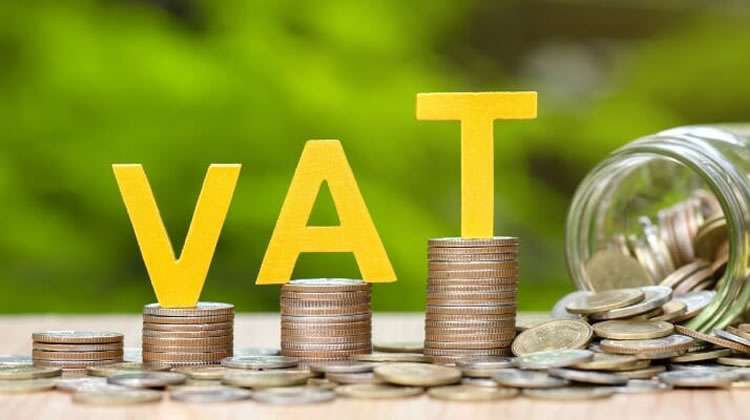Wondering if your small business is exempted from paying VAT in Nigeria? Find out in this comprehensive guide.
Yes, small businesses pay VAT in Nigeria, but there’s more to the story than meets the eye.
VAT, as you probably know, stands for value-added tax. It is a levy on goods and services as they journey through the production and distribution stages — a multistage tax.
This tax is borne by consumers, collected by businesses, and remitted to the government, bolstering public finances.
Recommended For You: Learn everything you need to know about applying for the Tony Elumelu Entrepreneurship Programme, writing a stand out proposal, and winning the $5,000 grant. We even included a TEEP application checklist to help you stay on track. Start Your Journey Now
But, the story does not end here, as not all businesses are required to pay VAT.
Continue reading for the full story.
Table of Contents
Key Takeaways (Editor’s Pick)
- VAT is a multistage tax paid by consumers, collected by businesses, and remitted to the government.
- Final consumers ultimately bear the VAT cost.
- Being VAT-registered can improve your business image and establish trust with clients and vendors.
- Non-compliance may result in severe penalties and fines and even cause reputational damages.
- Seek professional advice if you encounter issues or want to stay updated with VAT trends.
- Automated VAT systems can help you start complaints with little effort.
Who Pays VAT in Nigeria?
In Nigeria, final consumers pay VAT, as sellers include this tax in the price of goods and services.
But that’s not all.
Earlier, we mentioned that a VAT is a multistage tax, an indirect levy on the same goods at successive production and distribution stages. For example, A raw materials dealer sells its product to a factory for ₦101, ₦1 of which is VAT. The raw materials dealer remits the ₦1 to the tax authority.
The factory produces automobile tires with these materials and then sells them to a car manufacturer for ₦202. ₦2 is VAT.
Then, the factory deducts ₦1 for the VAT on the raw materials and sends the other ₦1 to the government.
Subsequently, the car manufacturer sells the tires to an auto parts retailer for ₦303, which includes ₦3 VAT.
The manufacturer deducts ₦2 as input VAT and sends ₦1 to the tax authority.
Finally, the auto parts retailer sells a set of tires to a consumer for ₦404, including ₦4 VAT.
The retailer removes the ₦3 tax paid to the manufacturer and remits ₦1 to the government.
From the above example, the retail consumer ultimately pays the VAT because they cannot deduct the input VAT paid by previous stages.
In Nigeria, the standard VAT rate is 7.5 percent, which was increased from five percent on February 1, 2020, by the Finance Act 2019.
Furthermore, only businesses that meet the VAT threshold of an annual turnover of N25 million Naira or more must collect, pay, and file a VAT return.
In addition, Nigerian companies engaged in VAT-eligible transactions involving non-resident companies, governmental agencies, government ministries, and those in the oil and gas industry are required to deduct and directly remit Value-added tax to the tax authority.
Having discovered who pays value-added tax, let’s move on to who is exempted from paying VAT in Nigeria.
Who is Exempted from Paying VATs
According to the Nigerian Federal Inland Revenue Service, you are exempted from VAT if you sell or render the following goods and services:
- Pharmaceutical and medical products: All medical and pharmaceutical products are exempted from VAT
- Agricultural equipment and products (Farming machinery and fertilizers).
- Basic food items (including any unprocessed staple food item, whether or not it is packaged).
- Educational materials (Books and materials used for educational purposes).
- Baby products (This includes products like baby food, wipes, and diapers).
- Charitable organizations
- Residential leases
- All exports from Nigeria (These are zero-rated goods and services and are not subject to VAT).
So, if your small business falls under these categories or deals with these products, you’re not required to pay VAT.
However, we recommend staying current with the latest guidelines and regulations from the Federal Inland Revenue Services (FIRS), as the list of VAT-exempted goods and services is subject to change.
Why Pay VAT for Your Small Business?
Did you know that certain clients and vendors might favor working with your small business if you’re VAT-registered? Particularly when they are likely to make considerable purchases.
Some other reasons you might want to consider paying VAT for small businesses include:
Improved business image
Running a VAT-registered small business can establish an air of authority and permanence for your firm, which can help build trust with suppliers and customers.
Reclaim VAT paid on business purchases
With a VAT-registered business, you can reclaim VAT paid on business purchases. This can help lower business running costs and improve cash flow.
Avoid Fines and Penalties
A small business that’s eligible but fails to register for VAT may face severe penalties, including substantial monetary fines
Remember that VAT registration also comes with additional responsibilities, such as early VAT returns submission, keeping accurate records, and charging the correct amount of VAT on all taxable services and goods.
Hence, we recommend carefully considering the pros and cons of registering for VAT before deciding.
How to Register for Small Business VAT in Nigeria
To register for VAT as a small business in Nigeria, first, obtain a Tax Identification Number (TIN).
Follow these steps to get your TIN in five days.
Then, visit the nearest Federal Inland Revenue Service (FIRS) or State Internal Revenue Service office with the required documents. If you’re registering for a limited liability company you’ll need:
- The Memorandum and Articles of Association of the company.
- Certificate of Incorporation, CAC2, and CAC 7A (Incorporation documents).
- Duly completed and stamped VAT registration form.
- Utility Bill.
- Application letter on Company’s Letterhead.
…while these documents work for those with a business name certificate:
- Business Name registration certificate.
- Duly completed and stamped VAT registration Form.
- Utility Bill.
- Application letter on Letterhead
Submit your documents to complete your registration process.
Once approved, you’ll receive a unique 10-digit VAT identification number for VAT returns and invoicing.
Ensure timely registration within the first six months of starting your business and adhere to VAT return filing deadlines to avoid penalties.
VAT Compliance for Small Businesses
As a VAT-registered small business owner in Nigeria, you are required to comply with the FIRS’ VAT regulations to avoid penalties and fines.
Here are some tips for VAT compliance for small businesses in Nigeria:
Register for VAT
According to the Value Added Tax Act, small businesses that meet the threshold for VAT of an annual turnover of N25 million or more must register for VAT.
However, small businesses that have an annual turnover below the threshold can choose to register for VAT voluntarily.
Charge the correct amount of VAT
Registered businesses are required to charge VAT on all their taxable goods and services and remit the collected VAT to the Federal Inland Revenue Service (FIRS).
In Nigeria, the prevailing VAT rate stands at 7.5 percent.
Charging the correct VAT amount on all taxable goods and services is crucial to avoid penalties.
Keep Accurate Records
Small businesses are required to keep accurate records of all their VAT transactions, including invoices, receipts, and VAT returns.
This will help to ensure that the correct amount of VAT is charged and remitted to the FIRS.
Submit VAT Returns on Time
As a registered business, you are required to submit VAT returns on or before the 21st day of the month following the month of the transaction.
Failure to submit VAT returns on time may result in penalties or fines.
Seek Professional Advice
Small businesses may seek professional advice from tax consultants or accountants to ensure they comply with the VAT regulations.
In summary, if you own a VAT-registered small business in Nigeria, it’s crucial to comply with the VAT regulations to avoid penalties and fines.

Ready to stay VAT compliant and avoid penalties?
Download our comprehensive VAT compliance checklist for small businesses in Nigeria now! It’s your key to ensuring you’re on the right track with VAT regulations.
Consequences of Non-compliance With Small Business VAT
Failure to adhere to VAT regulations for small businesses in Nigeria can incur severe repercussions through penalties and fines.
Here are the potential outcomes of non-compliance:
Penalties
You may face penalties if you neglect VAT registration or timely VAT return submission.
Initially, you’ll pay N10,000 as a penalty for non-registration for the first month of non-compliance and N5,000 for subsequent months.
Continued non-compliance may result in the sealing of business premises.
Interest and Charges
Delaying VAT payments as a small business may incur interest and additional charges on the outstanding amount.
Legal Action
The Federal Inland Revenue Service (FIRS) may initiate legal proceedings against non-compliant small businesses, potentially leading to court actions and extra expenses.
Harm to Business Reputation
Non-compliance with VAT regulations can tarnish the reputation of small businesses, making it challenging to attract customers and suppliers.
In summary, small businesses in Nigeria must ensure compliance with VAT regulations to avert penalties, interest, legal actions, and damage to their reputation.
Vital steps include VAT registration, accurate VAT charging, record-keeping, timely VAT return submission, and seeking professional guidance when needed.
Challenges Small Businesses Face with VAT Compliance
Here are some of the challenges you’ll likely face complying with VAT regulations in Nigeria.
VAT Compliance Challenge 1: Complex VAT System
Several small business owners struggle to understand and comply with the regulations associated with the VAT systems in Nigeria.
This can cause non-registration, delayed remittance, or charging the incorrect fee.
How to Navigate this Challenge
To navigate this problem, we recommend:
Seeking Professional Advice
If you struggle to comprehend how VAT works in Nigeria, consider consulting a tax expert to explain the details to you. You can also refer back to the professional if you ever run into problems.
VAT Automation
We’re in a period where you don’t need to do everything manually. There are several automated systems to help you out with some of your tasks.
The same is true for value-added taxes.
You can adopt an automated VAT System that collects taxes directly from you, the taxpayer.
These systems could be in the form of browser plugins or easy-to-use applications.
You can learn more about the FIRS VAT automation program here
VAT Compliance Challenge 2: High Cost of Compliance
Implementing a VAT system can sometimes be costly for your small business, especially if you have limited resources.
Whether your newly adopted automated VAT system is too expensive for you or the costs of taxes are weighing down on your business, we can help you navigate these problems.
How to Navigate High Costs of Compliance
Use an Automated System You Can Afford
Not all automated Value-added tax systems are free.
So, If you’re using an automated VAT payment system, we recommend considering a cheaper one until you’re ready for one that costs more.
Seek Ways to Ease Your Cash flow Issues
However, if you’re not using an automated VAT system but still struggle with compliance costs, consider budgeting for taxes in advance and explore options like payment plans or short-term loans to help with the financial strain.
VAT Compliance Challenge 3: Record-Keeping Burden
Juggling between your business activities and maintaining accurate records of VAT transactions can sometimes be a chore.
In such situations, you might prioritize one while the other suffers.
Or it could be record keeping is too much of a complicated process.
Don’t worry. There are solutions.
How to Navigate Record-Keeping Burdens
- Invest in user-friendly accounting software or tools that can simplify the record-keeping process.
- Training your staff in good record-keeping practices is equally important, especially if you don’t plan on handling the records yourself.
- Seek advice from accounting experts or business owners who have their record-keeping situation under control.
VAT Compliance Challenge 4: Inconsistent Enforcement
Sometimes, VAT regulations can make you unaware. Other times, you know these requirements, but the tax bodies aren’t sticking to the usual enforcement systems.
How to Navigate Inconsistent Enforcements
This particular challenge is one you cannot control, but you can prepare yourself for it.
We recommend staying informed about the latest VAT enforcement policies and updates.
Strive to maintain open communication with tax authorities to ensure you are aware of any changes and their impact on your business
VAT Compliance Challenge 5: Lack of Awareness
Perhaps you don’t fully understand VAT regulations or what these value-added taxes are.
How to Navigate Lack of Awareness
Don’t hesitate to seek educational resources and attend workshops to understand VAT regulations better.
From our experience, knowledge is your best defense against non-compliance.
VAT Compliance Challenge 6: Late Payment of VAT
Like many business owners, you may struggle with timely VAT remittance.
It’s understandable, especially if you have a lot on your plate.
However, late payments can attract penalties and fines.
How to Avoid Late VAT Payment
- Establish a schedule and set reminders
- Adopt online filing and payment systems.
- Keep accurate financial records.
- Seek the services of a tax professional.
- Automate your payments if possible.
- Remember, you’re not alone in facing these challenges.
VAT Compliance Challenge 8: Impact of Penalties and Fines
Penalties and fines are the repercussions of non-compliance with VAT regulations.
These penalties can sometimes cause financial or reputational damage to your business.
How to Avoid Penalties and Fines
Staying informed and aware is your best defense against these penalties and fines.
Seek a tax professional if you need help with understanding how VATs work.
Also, invest in record-keeping training if you feel you’re lacking in that area.
Remember, you’re not facing these challenges alone.
Many small business owners encounter similar issues with VAT compliance.
However, with our tips—seeking help, staying informed, and using available resources—you can navigate these challenges more effectively and ensure your business remains VAT compliant.

How to Pay Your VAT in Nigeria
Learn how to pay your VAT in Nigeria in 5 minutes. Use the expert tips here plus the free downloadable VAT payment checklist to navigate the Nigerian VAT landscape.
FAQs
What are the Challenges Faced by Taxpayers in Nigeria?
Taxpayers in Nigeria face challenges such as high tax rates, complex tax regulations, limited access to public services, widespread tax evasion, and a lack of comprehensive tax education and resources.
These obstacles can make complying with tax obligations difficult for individuals and businesses.
What Goods and Services are Exempted from VAT in Nigeria?
In Nigeria, goods and services that are exempted from Value Added Tax (VAT) include:
- Pharmaceutical and medical products
- Agricultural equipment and products (farming machinery and fertilizers)
- Basic food items (including unprocessed staple foods, whether or not packaged)
- Educational materials (books and materials used for educational purposes)
- Baby products (such as baby food, wipes, and diapers)
- Charitable organizations
- Residential leases
- All exports from Nigeria (zero-rated goods and services)
The FIRS guidelines and regulations are subject to change, so it’s important to stay up-to-date on the latest ones. You can find the most recent information on the FIRS website.
What are the Limitations of VAT?
Limitations of VAT in Nigeria include:
- Tax evasion
- Double taxation
- Disputes from exemptions and special schemes
- VAT Impact on Prices
- Regressive taxation (placing a higher burden on low-income earners since they spend most of their money on consumption).
- Expensive compliance costs
What Happens if You Avoid Paying VAT?
Avoiding paying Value Added Tax (VAT) can lead to legal consequences such as penalties, fines, and potential criminal charges.
How Does Taxation Affect The Nigerian Economy?
Taxation in Nigeria provides government revenue for economic development and public services. It can also stimulate growth, redistribute wealth, and be a fiscal tool.
However, challenges like tax evasion and a complex system can hinder its positive impact.
Small Business VAT Payment in Nigeria: Now, What Next?
What’s next for your small business in Nigeria?
Embrace VAT compliance as a pathway to enhance your business image, establish trust, and access financial benefits. We recommend seeking professional advice when needed, considering VAT automation, and keeping informed about changing regulations.
And don’t forget to download our VAT compliance checklist.

